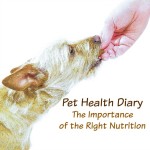* By Jeffery Roberts
Many people make the mistake of thinking that dogs are mostly carnivorous, and therefore do not need to eat vegetables. The truth is that vegetables, and some fruit, are an important part of your dog’s diet and a primary source of micronutrients.

The vitamins and nutrients in vegetables can help your pet live a longer and healthier life. Whether you are feeding a raw diet, and need to add in nutrients, or you are simply looking to supplement your pet’s current food regimen, these are the fruits and vegetables you should be focusing on:
Beets
Fresh, oven-roasted beets are a nutritional powerhouse for your dog. They contain B vitamins and are powerful detoxifiers due to their high antioxidant levels. They may help to reduce allergy sensitivities in your pet and reduce itching. They also fight inflammation and can help reduce the symptoms of arthritis in older pets. Be sure to not overfeed beets because they are naturally high in sugar, and never feed your pet beet greens. The greens contain oxalic acid, which can be toxic in high amounts.
Carrots
Carrots are high in many nutrients including beta-carotene and vitamin A, both of which support eyesight. Vitamin A is also important for the immune system and gives a boost to your dog’s skin and coat. Carrots can also help to improve dental health, acting as a natural toothbrush as your pet chews away. They are also low in calories, which makes them safe to use as treats on a regular basis.
Berries
Berries, especially blueberries, are rich in antioxidants that reduce inflammation and may also help to prevent cancer. They also hinder the growth of bad bacteria and can help to fight infections. Berries are easy for dogs to digest and can be fed regularly in moderation.
Broccoli
Broccoli can be given to your dog either raw or cooked, and should be a regular part of your pet’s diet due to its nutrient-rich super powers! Broccoli helps with detoxification, maintaining skin and coat health and helps protect the heart. Broccoli is high in vitamin C, which helps boost immunity for your pet much like it does for humans, and is also high in fiber.
Kale
Kale helps to prevent heart disease, allergies, arthritis and urinary tract infections. It’s packed with vitamins and nutrients, including B vitamins that help maintain a healthy coat and nervous system. It’s low in calories and high in fiber, making it ideal for regular supplementation to your pet’s food.
Asparagus
Asparagus is another vitamin-packed vegetable that is non-toxic to dogs. Asparagus, unlike some other vegetables, is also high in minerals like copper, phosphorous and potassium. It is also high in B-vitamins and vitamin K. It is known to help with immune health, nervous system function and to help regulate blood sugar, making it great for dogs who are at risk of diabetes. Asparagus is tough when raw, so it is best served to your pup after lightly steaming it.
Pumpkin
Pumpkin is high in vitamins like potassium and iron, and can also offer a great digestive aid for dogs. It can be served raw, cooked or even canned and can help promote regularity if your pet suffers from diarrhea or constipation. Some holistic vets will also recommend pumpkin to aid in weight loss for dogs, by replacing a portion of their regular food with a similar amount of canned pumpkin on a daily basis.
Sweet Potato
Like pumpkin, sweet potato is also a helpful vegetable for regulating your pet’s digestion and can have a soothing effect on the digestive tract. Dogs also love its sweet flavor! They’re also high in vitamin B6, vitamin C and manganese. Sweet potatoes have become common in many reputable dog foods, so check your wet or dry food’s label before adding additional sweet potato to your dog’s diet.
Introducing your dog to new fruits and vegetables
Your dog has a much less varied diet than you do and is likely not accustomed to many new foods. A dog’s digestive tract also functions best with consistency, so practice awareness as you introduce more fruits and veggies into your dog’s diet. It is recommended to introduce each one separately, in small amounts, so that your dog can get acclimated and you can observe to see if it causes any upset to his unique digestion.
Conclusion
Fruit and vegetables provide important nutrients that boost your dog’s health and help to protect him from diseases like arthritis, diabetes and cancer. When introducing new fruits and veggies, start slow to give your pet time to get used to them. Before you know it, your pet will be loving his new diet and be healthier than ever!
 About the author: Jeffery Roberts
About the author: Jeffery Roberts
Jeffery is a pet enthusiast and volunteer at his local pet shelter. His passion for animals started at an early age and through his work on becoming a veterinary student he understands and cares for pets of all species. Jeffery currently writes for The Happy Pooch and has 2 cats, a bird and a dog - Lucy.







I would never have thought to feed dogs vegetables! Some great information, thanks for sharing!
I thought that pets should only really eat dried food, although the picture that’s being painted here is that raw veg is fine - nature etc. Depending on budget I would have thought the costs would soon mount up though. Keen to hear what others think
Well it certainly sounds like a better option than food constantly from a tin or pouch.
Indeed, it does.
My sister just got a dog, so she would certainly benefit from this educational post.
I never knew dogs could eat any of these. Good info to have.
I always thought of dogs eating ‘meat’ only diets but it is good to know what vegetables you should feed them if you own a dog! x
This is such an interesting read. My friend has just gotten a dog and she will love this post
This is such an interesting read! My friend has just gotten a dog and she will love this post
I also never thought dogs eat vegetables. I will spread the word. 🙂
My dog used to love a Sunday roast with veg! He thought it was the best thing in the world, Gave him terrible wind tho haha! x
We used to have a beagle and he would love it when I would give him our leftovers on a Sunday roast. I would always make far too much veg and he loved it all!
Such a informative post! My auntie makes all her own food for her dog. x
I would never if thought to feed a dog vegetables! Some good information here lovely x
This may sound silly but I’ve never thought to feed my dog vegetables!! He has a complete dog food mix but when I give him leftovers a treat I never think to give him the veg! I will definitely do so in future!